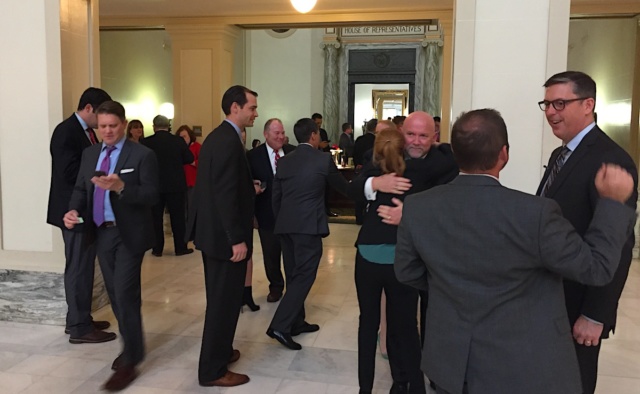

Entering the Oklahoma State Capitol for the first time as a reporter this session, I felt overwhelmed. Many people see the state Capitol as a catalyst for inefficiency, but I walked in with a different perspective. The grandiose nature of the building made me believe important factors were at play. While I understood the basic process of legislation, I recognized holes in my own knowledge that could best be filled by experience.
As a bill tracker for the Journal Record Legislative Report, my first objective at the Capitol in January was to cover the Senate Budget Hearing on Select Agencies. The meeting consisted of a small group of Senators asking the same budgetary questions to representatives of various state agencies for hours on end.
“How do your agencies fees compare to surrounding states?”
It was easily my most mundane experience of the session.
RELATED
5 things I learned as a social media intern by Carleigh Foutch
After a couple weeks covering committee meetings, I began to feel more comfortable in my position. I grew more aware of the process’s ins and outs. I would stay in meetings after they adjourned to meet lawmakers and make their acquaintances. In general, most of the legislators I met were polite and cordial. However, it became clear several had allowed the limited power of being elected to the Legislature inflate their heads.
I’m sure you’re shocked.
One thing I found interesting was how cliques seemed to form amongst the parties. For instance, I noticed Rep. Collin Walke (D-OKC), Rep. Forrest Bennett (D-OKC), Rep. Eric Proctor (D-Tulsa) and Shane Stone (D-OKC) remained close through the session. It’s easy to think D’s will side with D’s, and R’s will side with R’s, but it can go deeper than that.
Between the parties, lawmakers generally express a fair amount of respect for members on the other side of the aisle. But if one thing can quickly degrade respect into loathing, it would be a $900 million dollar budget shortfall.
As the session went on — and a budget plan became foggier — tempers grew short. Neither side seemed fully ready to come to the table with resolute compromise, though both claimed they were and their counterparts were not. But can you blame them?
The Democrats control only about a quarter of the House, and less in the Senate, so anything that would give them leverage on the floor was pounced on. And the Republicans have a clear majority. Typically, it wouldn’t make sense to give in to Democrats when they control that much of the Legislature. But in the end, the parties were unable to come together for a comprehensive and bipartisan budget plan.
I learned a lot in my first year covering an Oklahoma legislative session. As the Capitol itself and the processes of government became less intimidating to me, I became able to understand some of the things that were not being said openly in meetings.
I also learned that not all legislators are predictable. Sometimes, when a strong case is presented, lawmakers will defy their party to vote their conscience. Overall, one primary takeaway was how ineffective a legislative body can be irrespective of one party having a staggering majority.
Despite that lack of productivity, at least we’ll be able buy booze on Sunday, assuming your county votes in favor of the idea. So cheers to that, Oklahoma.





















